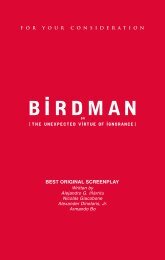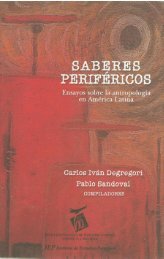blueprints
blueprints
blueprints
Create successful ePaper yourself
Turn your PDF publications into a flip-book with our unique Google optimized e-Paper software.
196 | toolkit: an idea, a pencil, and paper<br />
IDENTIFy PASSIONS, DEFINE VALUES, CREATE GOALS<br />
You may be tempted to skip this stage. Chances are, you are looking to<br />
start a poetry program because you are passionate about the art or because<br />
you have become convinced it will help you bring your community together<br />
in important ways. This is obvious to you. You’ve already decided<br />
you want to do the work, and you’re ready to dash ahead.<br />
All the essays in this book make clear that passion and values are the<br />
fuel for the engine of any poetry program. They keep you connected with<br />
why you want to do the work in the first place, and they help you do it<br />
well. You can help yourself now as you’re getting started and also down the<br />
line if you take a little time to articulate why this work matters to you, why<br />
you value it, and, from there, why it might matter to others. Having done so<br />
will also help you when the time comes to persuade others to come on<br />
board or give you money. Finally, it will give you a touchstone to return to<br />
in moments of growth or crisis, which will inevitably arise.<br />
Even more than this, examining your own motivations—the why of<br />
what you are doing—can help you begin to define the what and the how in<br />
a way that increases your chances of success.<br />
Begin by asking yourself some basic questions—preferably in the company<br />
of other, like-minded people who might be interested in working<br />
with you or at least in sharing their ideas with you.<br />
Does a passion for poetry itself make you want to do this work?<br />
If so, ask yourself what first got you engaged with poetry in a passionate<br />
way and what that early experience was like. What makes poetry feel<br />
essential and important to you? How can you best communicate and share<br />
that essence and importance with others?<br />
At the beginning of “The Flywheel,” Bas Kwakman says, “It was the<br />
sound of a poem that made me fall in love with poetry once and for all”—<br />
“the sound of a poem,” he says, even though it wasn’t even the poet’s own<br />
voice and language he was hearing but rather a translation read by a translator.<br />
Still, it’s no accident that Kwakman’s essay begins there; as a musician, he<br />
is deeply sensitive to sound, and in the rest of his essay he writes eloquently<br />
about how, since that moment, he has tried to bring people into poetry<br />
through “the sound of [poems].” Because this value is so important to Kwakman,<br />
he works especially hard to find new ways to let audiences experience<br />
poems in translation while hearing them in their original voices.







